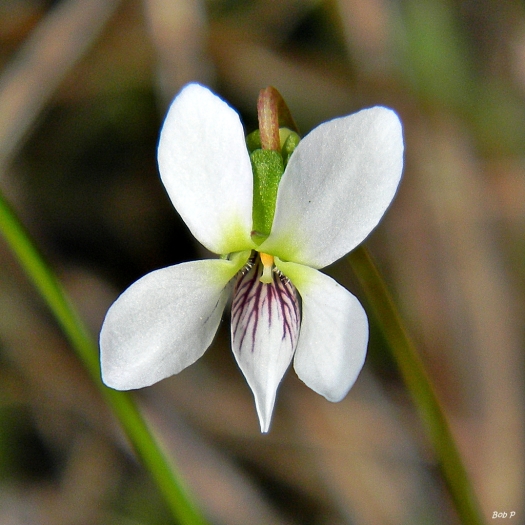Lance-Leaved Violet
(Viola lanceolata)
Lance-Leaved Violet (Viola lanceolata)
/
/

Bob Peterson
CC BY 2.0
Image By:
Bob Peterson
Recorded By:
Copyright:
CC BY 2.0
Copyright Notice:
Photo by: Bob Peterson | License Type: CC BY 2.0 | License URL: https://creativecommons.org/licenses/by/2.0 | Uploader: FlickreviewR 2 | Publisher: Wikimedia Commons | Title: Viola_lanceolata.jpg | Notes: {{Information |Description=Yellow pansy (''Viola pedunculata'') |Source=self-made |Date=4-1-06 |Author= [[User:Calibas|Calibas]] }} [[Category:Viola pedunculata]] |














































Estimated Native Range
Summary
Viola lanceolata, commonly known as Lance-Leaved Violet or Bog White Violet, is a perennial herb native to moist meadows, marshes, and stream margins in eastern North America. It is a stemless plant that typically grows 10–15 cm (4–6 in) tall, with narrow, lance-shaped leaves. The flowers are white with five petals, the lower three of which are adorned with purple veins, and they bloom from May to June, offering a subtle yet charming display. The plant spreads via stolons, which are above-ground root-like structures.
Lance-Leaved Violet thrives in wetland areas and is often used in rain gardens, naturalized areas, and as a ground cover in moist, shady spots. It is valued for its ability to adapt to wet conditions and for the delicate beauty of its flowers. In cultivation, it prefers full sun to part shade, consistent moisture, and can tolerate a range of soil types provided they have medium to slow drainage. While it is not prone to serious diseases or pests, it can be sensitive to drought and may require additional watering during dry periods. This violet is not typically invasive but can spread in favorable conditions, so gardeners should monitor its growth.CC BY-SA 4.0
Lance-Leaved Violet thrives in wetland areas and is often used in rain gardens, naturalized areas, and as a ground cover in moist, shady spots. It is valued for its ability to adapt to wet conditions and for the delicate beauty of its flowers. In cultivation, it prefers full sun to part shade, consistent moisture, and can tolerate a range of soil types provided they have medium to slow drainage. While it is not prone to serious diseases or pests, it can be sensitive to drought and may require additional watering during dry periods. This violet is not typically invasive but can spread in favorable conditions, so gardeners should monitor its growth.CC BY-SA 4.0
Plant Description
- Plant Type: Herb
- Height: 0.2-0.5 feet
- Width: 0.2-0.5 feet
- Growth Rate: Moderate
- Flower Color: White
- Flowering Season: Spring, Summer
- Leaf Retention: Deciduous
Growth Requirements
- Sun: Full Sun, Part Shade
- Water: Medium, High
- Drainage: Medium, Slow
Common Uses
Bee Garden, Border Plant, Butterfly Garden, Deer Resistant, Fragrant, Low Maintenance, Water Garden
Natural Habitat
Moist meadows, marshes, and stream margins
Other Names
Common Names: Lance-Leaved Violet, Strap-Leaved Violet, Water Violet, Lance-Leaf Violet, Eastern Water Violet, Strap-Leaf Violet, Violette Lancéolée, Violette Élancée, Lanceleaf Violet
Scientific Names: , Viola lanceolata, Viola lanceolata subsp. lanceolata, Viola lanceolata subsp. vittata, Viola lanceolata var. vittata, Viola vittata, Viola lanceolata var. lanceolata, Viola denticulosa, Viola attenuata,
GBIF Accepted Name: Viola lanceolata L.